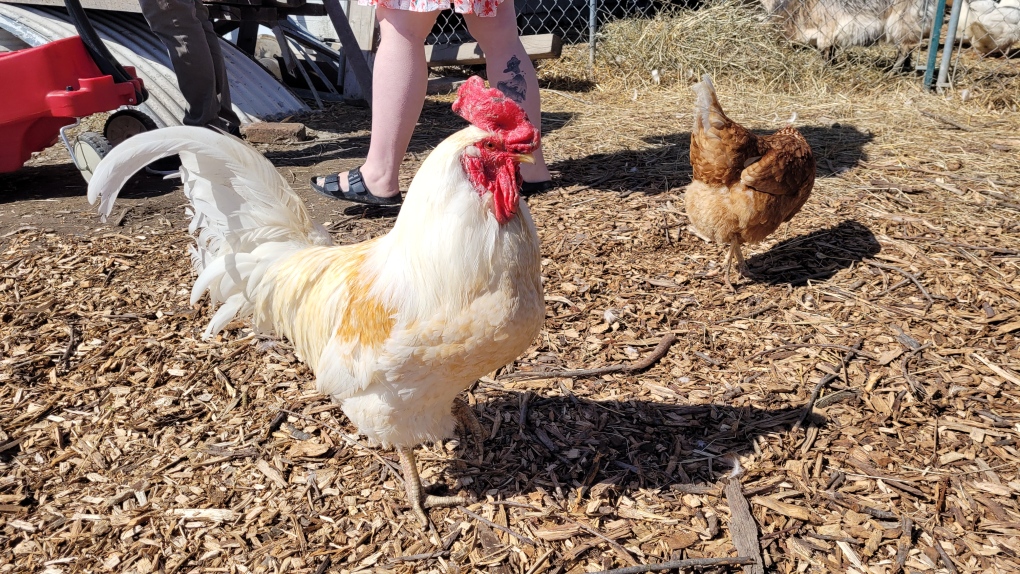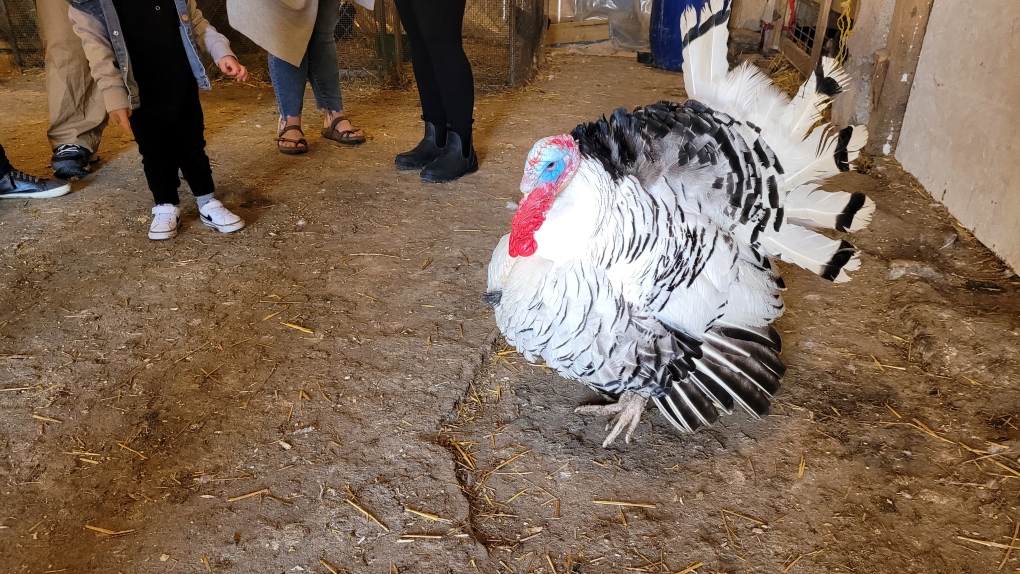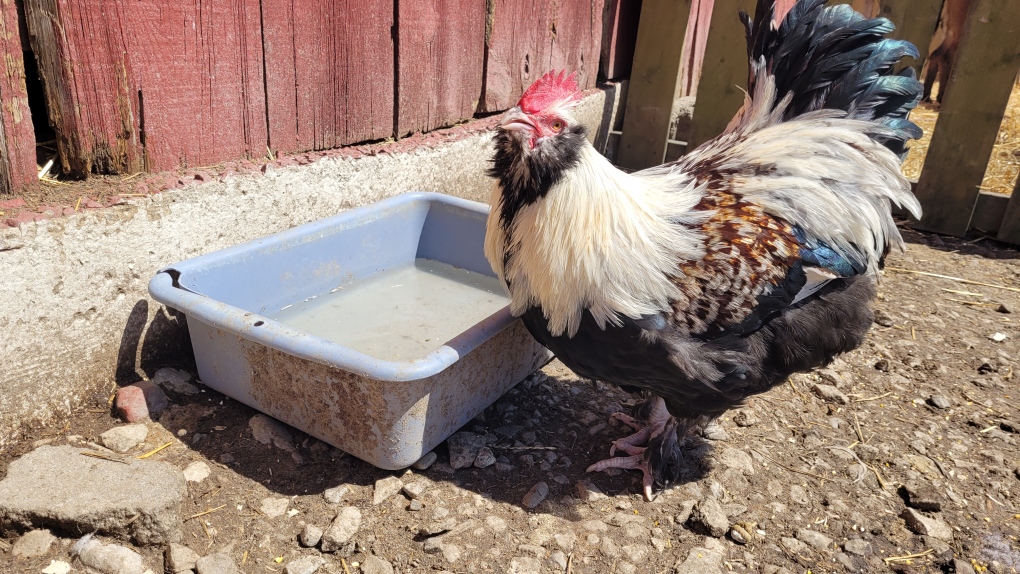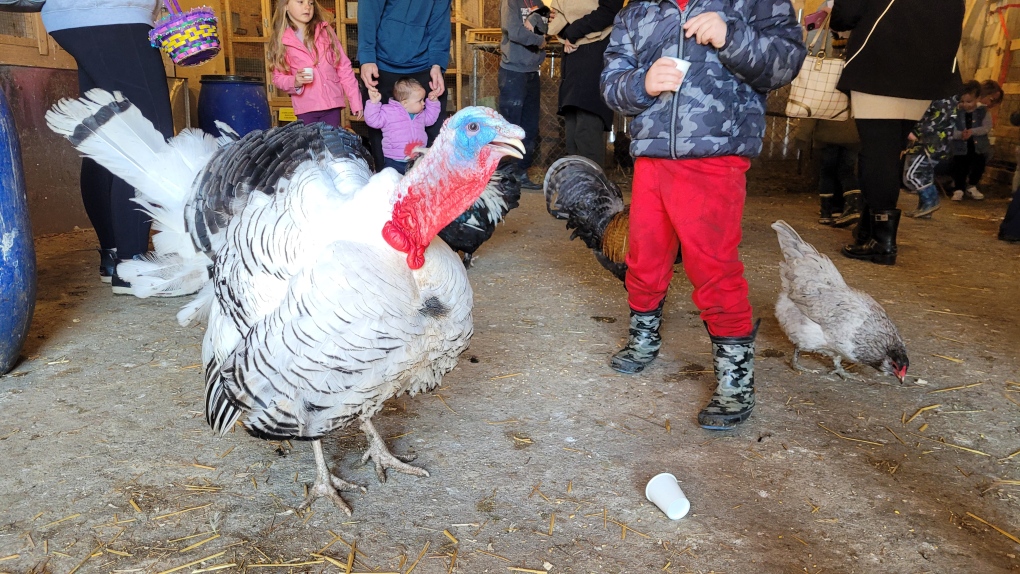Cottam farm opens barn doors to the public, taking precautions as bird flu cases emerge in Canada, U.S.
As a Cottam farm opens its barn doors to the public for Easter weekend, its owner says she's taken the appropriate steps to ensure the safety of her birds — and visitors — amid avian flu cases emerging in other parts of North America.
"My primary business is breeding chickens and ducks and geese. So it is a concern to me," said Nicole Winkels, owner and operator of Sunny Britches Acres.
The farm started running private tours back in September. After receiving "phenomenal" feedback from the community, Sunny Britches Acres held a grand opening on Saturday for the public to meet all of their animals.
But ahead of the event, Winkels said she's taken the proper steps to ensure the avian flu threat is mitigated.
 Chickens at Sunny Britches Acres farm in Cottom, Ont. on Saturday, April 16, 2022. (Sanjay Maru/CTV Windsor)
Chickens at Sunny Britches Acres farm in Cottom, Ont. on Saturday, April 16, 2022. (Sanjay Maru/CTV Windsor)
Just last week, Point Pelee National Park confirmed a single case of the bird flu. Meanwhile, the Canadian Food Inspection Agency (CFIA) has reported 16 instances of the avian influenza detected in Ontario poultry flocks between Mar. 27 and Apr. 14.
"The main concern with cross transmission is the wild waterfowl," said Winkels.
To greatly reduce the risk of wild birds coming to her farm, Sunny Britches Acres has taken down its wild bird feeders.
"We've put out notices. If you have your own flocks at home, don't wear your chore shoes to the farm to come visit," said Winkels, adding the notice also applies to anyone who steps on to her property from another farm.
 Turkey at Sunny Britches Acres farm in Cottom, Ont. on Saturday, April 16, 2022. (Sanjay Maru/CTV Windsor)
Turkey at Sunny Britches Acres farm in Cottom, Ont. on Saturday, April 16, 2022. (Sanjay Maru/CTV Windsor)
 Chickens at Sunny Britches Acres farm in Cottom, Ont. on Saturday, April 16, 2022. (Sanjay Maru/CTV Windsor)
Chickens at Sunny Britches Acres farm in Cottom, Ont. on Saturday, April 16, 2022. (Sanjay Maru/CTV Windsor)
"If you've been anywhere near wild waterfowl, change your shoes."
The farm, which raises birds such as free-range chickens, ducks, geese and emus, estimates about 400 people attended Saturday's grand opening.
According to the CFIA, avian flu viruses rarely cause disease in humans.
"Wild birds, especially waterfowl, are natural reservoirs of influenza viruses. They are not normally affected by the disease, but can still transmit it to domestic birds," the CFIA says on its website.
"The disease can spread to birds through contact with infected poultry and poultry products. It can also spread through contaminated manure, litter, clothing, footwear, vehicles, equipment, feed and water."
 Birds at Sunny Britches Acres farm in Cottom, Ont. on Saturday, April 16, 2022. (Sanjay Maru/CTV Windsor)
Birds at Sunny Britches Acres farm in Cottom, Ont. on Saturday, April 16, 2022. (Sanjay Maru/CTV Windsor)
CTVNews.ca Top Stories

Ford pushes for 'more proactive' border action after Trudeau meets with premiers about Trump
Ontario Premier Doug Ford is calling on the federal government to 'take a more proactive approach at the border' following a call Wednesday night between Prime Minister Justin Trudeau and all 13 premiers to discuss U.S. president-elect Donald Trump's tariff threat.
Liberals table GST holiday legislation, putting $250 rebate on backburner
Prime Minister Justin Trudeau's promised holiday consumer relief package has been split in half. After NDP Leader Jagmeet Singh said his party was only ready to help pass the GST/HST holiday portion of the affordability announcement, Deputy Prime Minister and Finance Minister Chrystia Freeland tabled legislation Wednesday that only seeks to enact that measure.
Missing hiker found alive after 50 days in northern B.C. wilderness
A missing hiker who spent 50 days alone in the frozen wilderness of northern British Columbia has been found alive.
Boeing plane makes emergency landing at Montreal's Mirabel airport after landing gear malfunction
No injuries were reported after a Boeing 737 was forced to divert to Mirabel airport after the aircraft experienced a technical issue with the landing gear.
Montreal billionaire Robert Miller could have as many as 100 victims, lawyer says
A Quebec judge is hearing arguments this week in a class-action lawsuit application against Montreal billionaire Robert Miller over allegations he paid minors for sex.
It's expensive to visit the Maldives. Now it's more expensive to leave, too
The Indian Ocean archipelago nation of the Maldives, known for its white sand beaches and coral reefs, has just increased the price it costs to leave.
Two Canadians arrested for failed murder plot in California
Two men who travelled from Canada to Monterey County have been arrested and accused of attempted murder after a triple-stabbing Sunday.
Northern lights forecast to fill the skies in Midwest U.S., some areas in Canada
The northern lights could be visible for residents in northern and upper Midwest states in the U.S. as early as Thursday, including some Canadian provinces.
Ontario to match GST holiday by removing provincial sales tax on some items
Ontario says it will match the federal government’s two-month GST holiday by removing provincial sales tax (PST) from items that are not currently covered by existing provincial rebates.

































